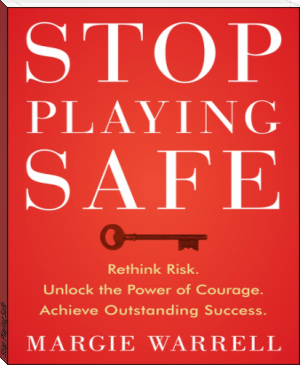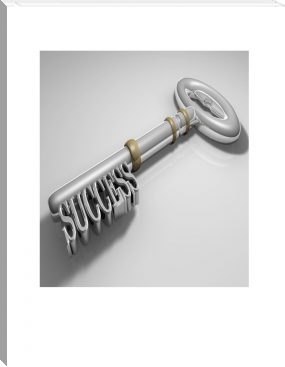Become More Productive and Successful - Rough Guider (moboreader .txt) 📗

- Author: Rough Guider
Book online «Become More Productive and Successful - Rough Guider (moboreader .txt) 📗». Author Rough Guider
Stealth mode. It could be argued that the best political players act in stealth mode. It will not always be visible to others. If you play politics, make sure you don’t rub people up the wrong way.
Your brand
Once you have read through most if not all of the chapters above you will automatically work out which tips work for you and which (quite frankly) don’t. When putting together your thoughts on how to succeed, and I believe that each chapter can be taken in isolation, you may also want to think some more about your brand within your workplace. How do people perceive you? Organized? A good time-keeper? Honest? Open? One of my recommendations is for you to write down the four to five things that you want to be associated with in terms of brand image. I’ve listed some ideas below, but you may of course add to these and/or substitute them with your own:
Are you seen as trustworthy?
Are you seen as an ideas person?
Are you perceived as a fair judge?
Are you seen as generous with your time?
Are you seen as a good developer of staff?
Are you seen as a technical wizard?
Are you seen as a good politician?
Are you perceived as putting the business’s goals before your own?
Do people associate you with energy and drive?
Do people associate you with good time-keeping?
Are you perceived as someone that gets the job done?
Are you viewed as pro-active?
Are you seen as someone that adds value?
Do people see you as someone that supports the business culture?
Are you perceived as someone that supports the party line?
Think about the questions above and then prioritize what is important to you and what you believe to be important for the business you work for. You may feel that you are already perceived in a good light for many of the questions and that you’d rather concentrate on the one of two that present the most running room for further development. Being circumspect is a really good thing and I recommend that you review your brand on a regular basis (at least annually). If you have some close colleagues that you trust sincerely by all means ask them to critique your brand and then work on the aspects that they feel you can improve upon. If you have a thorough and robust annual or six monthly appraisals process the results of that exercise should also give you some clues on how to improve. If not, and if you feel that it is appropriate within your business culture, ask your boss to comment on your brand. This is a question that if answered well can deliver to you some concrete action points outside the normal skills discussed at such review sessions. By all means ask your boss to set up regular ‘profile sessions’ (See ‘Managing staff’) to allow you and them to monitor the enhancement of your brand image over time.
You could certainly combine this analysis with a broader self-review incorporating your strength and development areas (in a similar fashion to the annual self-appraisal) if you wish to produce a wider more expansive, and perhaps holistic view of one’s persona and capabilities.
Random tips (and some fun)
There are a lot of tips and loads of advice that I’ve picked up during my career, some more fun than others, but all very useful when introduced into our day-to-day working lives. I think that this would be best presented in bullet point format:
Get them out of my office or away from my desk. If someone is in your office or by your desk and you need to get rid of them you can do so without even saying anything. This is a tried and trusted method which I was taught by the Chairman of a company I used to work for. He used to do this regularly to me! So this colleague is by your desk and the conversation (which may not even be work related) has clearly come to an end from your perspective. Take the bull by the horns and stand up and walk towards your door (if you have an office) or start walking towards to kitchen, toilets or reception (or wherever) as they are still talking. If you manage to take control of the conversation even better. My experience (we’re talking a 100% record here) is that your colleague will stand up when you do (a bit like when someone copies your movements on a date, that is, if they like you) and will walk with you to the door, or wherever you are going. You then simply let them carry on walking away. You meanwhile return to your desk or office as they continue towards the horizon. It does work. Please try it and perfect it.
Organize your work space and have it looking great. The thing is, you may think you know (or you may convince yourself that you actually know) where all your important documents are, but anyone looking at your desk will sub-consciously, or indeed consciously, place you in a box (not literally, unless you are unlucky) as the type of person who can’t organize a……… you know the rest. Having a smart workplace is often translated in the minds of others as being smart. Go on, put aside that hour and make the desk look terrifically organized.
Don’t get confused between hours and output. As a manager I would much rather my staff complete their daily routine within the standard office hours than burn the mid-night oil. In my mind it indicates that the person is either inefficient, or is deliberately staying late to impress me and others or truly has too much work to do. But guess what, a thirty minute conversation gets to the bottom of this very quickly. A good manager should sort this out pronto. Just remember, if the previous incumbent finished their work properly and accurately between 9 am and 5 pm why is someone else taking that much longer? Why should I pat you on the back or reward you with large pay rises? I’d rather reward the member of staff who introduces a more effective process, meaning that they can now take more work off my plate, freeing up my time to take higher level tasks and giving them the opportunity to take on more interesting work.
Nothing is ever as bad as it seems and nothing is ever as good as it seems. This isa fabulous concept to keep in mind. When the chips are down and you want to resign or simply feel awful then take a deep breath and see things through. Things rarely turn out as badly as you originally expected. On the other hand, if a project or implementation appears to be progressing without a hitch, well within budget, beating all the deadlines, then you should be prepared for an unexpected hurdle to suddenly appear. A good gut check would be to check your thoughts and/or concerns with someone more objective than you (friend, partner or colleague from outside your domain etc). No doubt they will be able to put things into perspective, helping you build back your confidence when things go badly and making sure you don’t become too arrogant when things go well.
Yes, you can grow into a role. At times people may not accept offers for promotion or fail to apply for a more senior role because in their mind (only) they do not have the relevant technical or management skills. I clearly remember my first larger scale managerial role. My inner-self had significant doubts about taking the role on as I was very worried about falling flat on my face. However, by taking a day-by-day approach (thus limiting stress and uncertainty) and putting in clear and measurable targets for myself (“I’ll learn this function by that date” and “I’ll meet that group of employees by that date” and “I’ll come out with my recommendations by that date”) it is amazing how well things turned out. That is, a homosapien has a natural propensity to grow into the role that is put before them. Most of us cope with becoming a team captain or a parent or an owner of a pet. We grow and mature as our responsibilities broaden. Hence, I would say, on balance, go for the job with the steep learning curve. You’ll look back a few months later and wonder what all the fuss was about. [Note: if a new role requires extensive travel that could significantly disrupt your family life, or content that you would simply not enjoy, then think again. I’m not talking about a job that would reduce your quality of life, simply one that would be a big step up for you.]
Bluff at your peril. I don’t recommend bluffing in any situation. You are likely to get caught out when the conversation gets deeper and, even if you think you have got away with bluffing, the other party may actually see through the sham. Don’t bluff, rather be prepared to say “I need to look into that and get back to you by the end of play today” (or whatever is appropriate!).
Remembering impressive facts. By this I don’t mean that you should be able to recall the 50 States of America or the names of the seven dwarfs but rather one or two facts about a client or other key contact that demonstrates your interest in them beyond the pure commercial. By way of example, imagine that the son of an important client has just gone to University on a 3 year course to study economics and accounting. Doesn’t it sound great if the next time you meet up (perhaps 6 months later) you can ask how John (the son) is doing now that he’s six months into that course? I have often seen very capable and forward thinking managers noting down in their diaries the names or children, pets, other halves, football teams and so on within their electronic communication devices. They don’t have to remember all this information (they probably won’t be able to) but they are more than capable of running through the contact details 15 minutes before the client meeting and making sure that they have the facts at the top of mind. Not only will the client be impressed with the fact that you remembered something very personal and important to them (they probably will have forgotten that they told you about John in the first place) but they will also be flattered. What a great start to a meeting.
Standing out. Here are some ways to stand out. I’m not recommending that you should try to stand out each and every day (that would be exhausting) but there are ways of raising your profile on a visible and regular basis. These are fun things not to be taken too seriously:
Dress up on a dress down day.
Wear a tie for a day in your office if no-one else does.
Get in early, if that’s something you rarely do (as long as you are seen to be in early).
Stay late, if that’s something you rarely do (as long as you are seen to be working late).
Sit outside in a workspace for a day if you have an office.
Introduce yourself to some entirely new people at work.
Buy your team or colleagues a tea or coffee.
Walk





Comments (0)